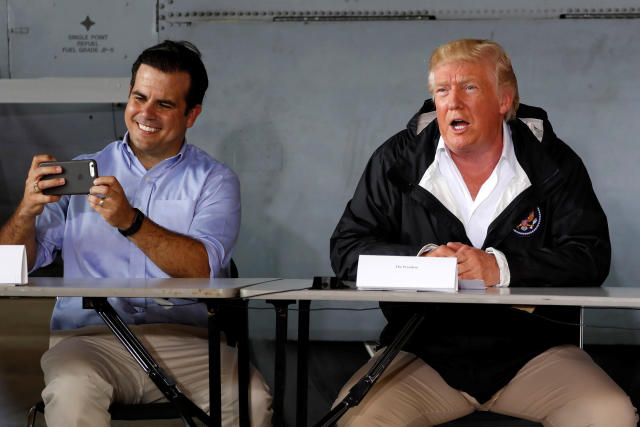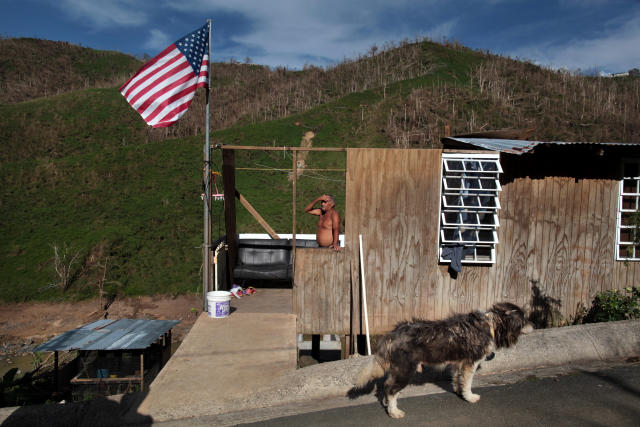U.S.
Puerto Rico Is A Man-Made Disaster
 Charles R. Venator-Santiago,HuffPost 12 hours ago
Charles R. Venator-Santiago,HuffPost 12 hours ago
Months after hurricanes Irma and Maria devastated Puerto Rico, what should have been an example of how one of the most powerful nations in the world could rebuild a territory is instead an example of a man-made catastrophe now moving to the mainland.
Today, about 60 percent of Puerto Rico’s population has access to reliable electric power. Access to potable water is compromised. Food and jobs are scarce, and houses are uninhabitable. More than 40 percent of schools do not have electricity. Thousands of police officers are not showing up to work, and violent crime is rampant.
President Donald Trump’s inability to effectively manage the federal agencies tasked with helping U.S. citizens in need has only compounded the problems created by Congress’ historically discriminatory policies toward Puerto Rico and the Puerto Rican government’s ineptitude at addressing local corruption.
One of the roles of the president is managing federal agencies. If the response to this year’s hurricanes has taught us anything, it’s that the agencies charged with assisting the Puerto Ricans are underfunded, understaffed and overextended. Take, for example, the federal response to the housing problem on the island. The U.S. Army Corps of Engineers collected tarps under Operation Blue Roof, but five months into the crisis, thousands of them are in storage. The USACE has fulfilled a little more than half of the requests, leaving upwards of 30,000 households without roofs.
Congress should stop treating Puerto Ricans as second-class citizens and step up to finance and supervise the rebuilding of the island.
But the executive branch is only part of the problem.
For more than a century, Congress, with the support of the Supreme Court, has governed Puerto Rico as an unincorporated territory ― that is, a territory that can be treated as a foreign country when it is convenient for the federal government. As a result, Congress has frequently authorized less funding for the development of Puerto Rico’s economy and federal assistance programs than it gives to states; it has also provided insufficient funds for infrastructure repair.
Federal lawmakers, again with the support of the Supreme Court, responded to the financial crisis in Puerto Rico by passing the Promesa Act. It declared that Puerto Rico was not a commonwealth with any degree of sovereignty, but was merely a territorial possession of Congress. The legislation created a financial overview board to manage the local economy in order to guarantee that the Puerto Rican government would pay an unpayable debt.
Even before two major hurricanes devastated Puerto Rico’s infrastructure last year, its government wasn’t able to generate sufficient revenue to pay its public debt obligations (some estimates place the debt at over $150 billion). Yet Congress, while it assumed control over Puerto Rico’s economy and while its financial oversight board sought to impose some of the failed austerity measures used in Kansas and Greece, has simultaneously refused to assume responsibility over the economic woes afflicting its territory.
And just last month, while it was clear that hurricanes had devastated the Puerto Rican economy, the tax reform bill Congress passed imposed new tariffs or taxes on U.S. companies that held foreign subsidiaries in Puerto Rico. The tariffs could force companies to choose between operating in Puerto Rico and leaving the island ― and could cost the Puerto Rican economy billions of dollars in local taxes and significant job losses.
What happens when a state does not have the necessary resources to absorb a traumatized migrant and provide for him and his family?
Unfortunately, some local politicians have also hindered efforts to help Puerto Ricans. During the hurricanes, Puerto Rican Gov. Ricardo Roselló failed to activate the island’s emergency management plan, and his administration’s response was poorly coordinated. It took him 40 days to assess damages and ask for federal money for rebuilding projects.
Roselló’s administration initially refused to hire the established American Public Power Association and instead granted multimillion-dollar contracts to shoestring companies like Whitefish Energy and Cobra Acquisitions to raise power lines across the island. Local media report almost every day that mayors and agencies on the island are embezzling federal relief money, and relying on partisan clientelism to provide or deny local services across the island.
The governor consistently refused to provide a transparent audit of the Puerto Rican government’s finances, and is busy trying to distract resident with a dead-end campaign for statehood.
Roselló proposed a fiscal plan last week that depends heavily on Congress’ commitment to give Puerto Rico more than $50 billion over the next five years. The plan operates on deficit spending and doesn’t promise to balance the government’s budget for another five years. It also doesn’t include payments to bondholders, which has been a nonstarter for the financial oversight board in the past. The board agreed to make a decision on the fiscal plan by Feb. 23.
As for Puerto Rican citizens, some are now being moved to the mainland without the necessary financial support. Under current practices, the Federal Emergency Management Agency assists in bringing Puerto Ricans to the mainland, providing temporary assistance with housing and a small amount of money to help rebuild homes on the island.
However, as we are experiencing in Connecticut, the state government is expected to assume responsibility for the well-being of the migrant once he or she arrives. Earlier this month, for instance, 36 families living at a Red Roof Inn in Hartford were abruptly told that they would have to leave earlier than expected after there was an error with FEMA paperwork. (The state stepped up to cover the cost of lodging at that hotel and others.)
The humanitarian crisis on the island is being moved to the mainland. What happens when there is no available work, housing or medicine? What happens when a state does not have the necessary resources to absorb a traumatized migrant and provide for him and his family?
Private charitable giving is not going to be enough to help Puerto Ricans. Trump should direct federal agencies to work together and with states, and have the government assume financial responsibility over the lives of these U.S. citizens. Congress should stop treating Puerto Ricans as second-class citizens and step up to finance and supervise the rebuilding of the island.
Yes, the people of Puerto Rico can and should take this opportunity to conduct a referendum on their own government. But we shouldn’t expect them to take on the challenge of recovering from these terrible disasters alone.
Charles R. Venator-Santiago is an associate professor with a joint appointment in the Department of Political Science and El Instituto, University of Connecticut. His most recent book is Hostages of Empire: A Short History of the Extension of U.S. Citizenship to Puerto Rico, 1898-Present.
- This article originally appeared on HuffPost.
- Above is from: https://www.yahoo.com/news/puerto-rico-man-made-disaster-104656503.html


No comments:
Post a Comment